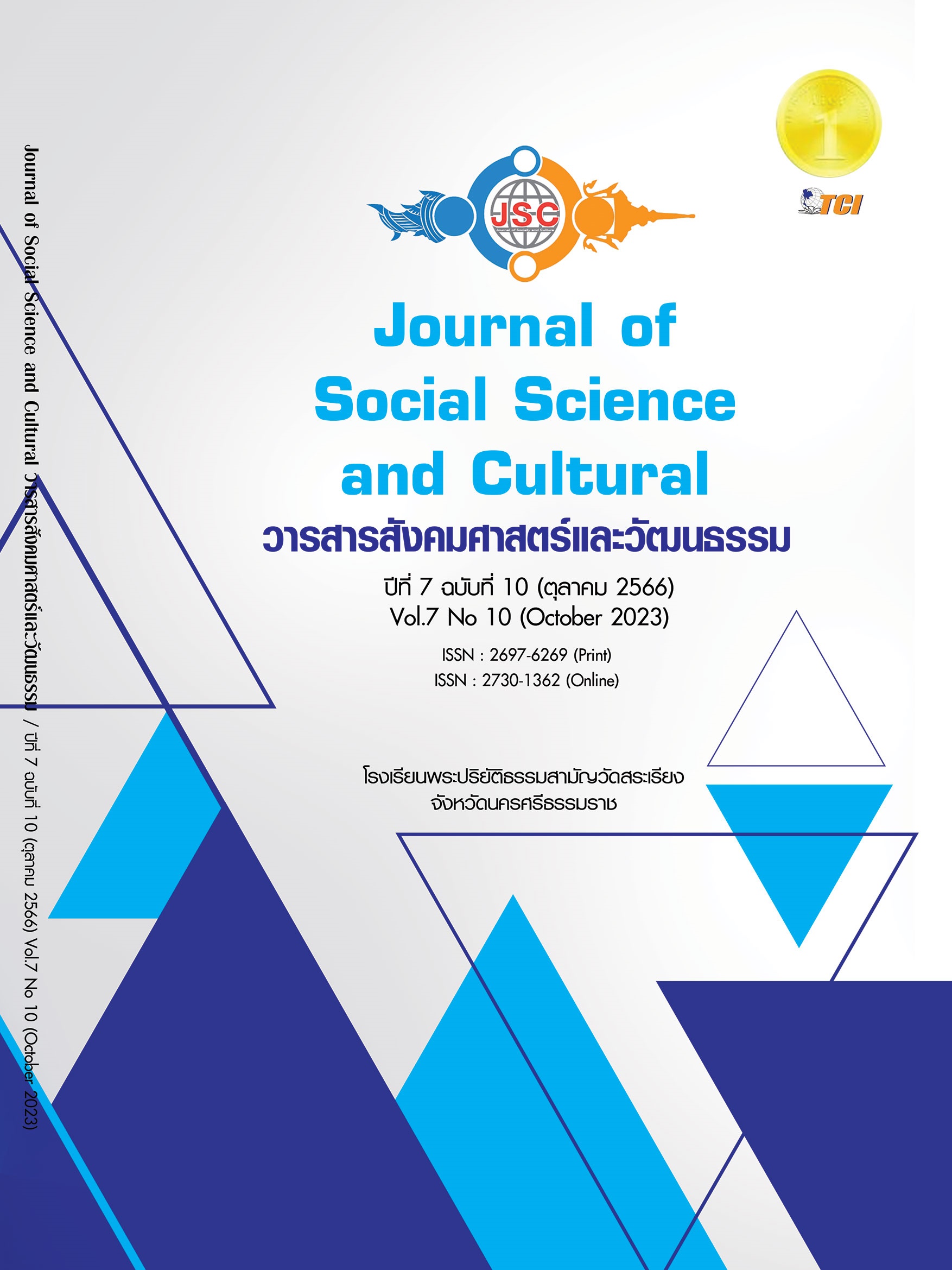AN MANAGEMENT MODEL TOWARDS EXCELLENCE OF PRIVATE EARLY CHILDHOOD SCHOOLS IN THE NORTHEASTERN REGION
Main Article Content
Abstract
This research article aims to 1) study the conceptual framework of an management model towards excellence of private early childhood schools, 2) Examine the appropriateness of the management model towards excellence of private early childhood schools, 3) create and evaluations of the manual for using an management model towards excellence of private early childhood schools in the northeastern region. It was a mixed methods research. The research was conducted in 3 phases: Phase 1 studied the conceptual framework of the management model for excellence. Phase 2 examined the suitability of management towards excellence. Phase 3 created and evaluated a manual for using the management model. to excellence. The sample group used for the research was 500 teachers and early childhood private school personnel using the stratified sampling method, 7 experts selected from school licensees, directors, educational supervisors, and university professors. The research instruments were questionnaires, interview form, and an evaluation form for using the management model towards excellence of private early childhood schools in the northeastern region. The statistics used in data analysis were percentage, mean, and standard deviation, confirm factor analysis and sequential correlation testing for consistency in multiple decisions making. The research findings were as follows: 1) the conceptual framework of an management model towards excellence of private early childhood schools in the northeastern region consisted of 4 components and 16 indicators. 2) The results of checking the consistency and harmony of the model revealed that χ2 = 125.233, df = 98, P-Value = 0.071, CFI=0.967, TLI = 0.960, RMSEA = 0.042, SRMR = 0.032, and the structural validity and reliability existed (C.R.) at 0.988 exceeding 0.60, that featured the consistency with the empirical data. 3) The results of the evaluations of the manual for using an management model towards excellence of private early childhood schools were appropriate at a high level.
Article Details
References
เกษศิริ กมล. (2556). การวิเคราะห์การบริหารโรงเรียนเอกชนที่มีความเป็นเลิศในประเทศไทยตามเกณฑ์มาตรฐานรางวัลคุณภาพแห่งชาติ มัลคอล์ม บอลดริจ. ใน ดุษฎีนิพนธ์ครุศาสตรดุษฎีบัณฑิต สาขาวิชาการบริหารการศึกษา. บัณฑิตวิทยาลัย จุฬาลงกรณ์มหาวิทยาลัย.
เชิดศักดิ์ ศุภโสภณ. (2553). การพัฒนารูปแบบการบริหารการเปลี่ยนแปลงสู่ความเป็นเลิศของสถานศึกษาขั้นพื้นฐานของรัฐ. ใน ดุษฎีนิพนธ์ปริญญาครุศาสตร์ดุษฎีบัณฑิต สาขาบริหารการศึกษา. คณะครุศาสตร์ จุฬาลงกรณ์มหาวิทยาลัย.
คณะกรรมการนโยบายเด็กปฐมวัย. (2564). แผนพัฒนาเด็กปฐมวัย พ.ศ. 2564 – 2570. กรุงเทพมหานคร: สำนักงานเลขาธิการสภาการศึกษา กระทรวงศึกษาธิการ.
จิราภรณ์ ผันสว่าง. (2559). ความเป็นมืออาชีพของผู้บริหารสถานศึกษา (Professional Education Administration: Basic Qualifications, Skills, and Vision). วารสารมหาวิทยาลัยมหามกุฏราชวิทยาลัย วิทยาเขตร้อยเอ็ด, 5(2), 247-254.
ธันฐกานต์ ทองสินเกียรติ และสิทธิพร นิยมศรีสมศักดิ์. (2556). เกณฑ์ปกติมาตรฐานการพัฒนาสถานศึกษาเอกชนขั้นพื้นฐานสู่ความเป็นเลิศ. วารสารวิชาการมนุษยศาสตร์และสังคมศาสตร์, 21(38), 191-211.
บรรจง ลาวะลี. (2560). หลักธรรมเพื่อการสร้างความสัมพันธ์ระหว่างโรงเรียนกับชุมชนอย่างยั่งยืน. วารสารพุทธปรัชญาวิวัฒน์, 1(2), 13-26.
บรรจง ลาวะลี. (2562). คุณธรรมสำหรับผู้บริหารในศตวรรษที่ 21. วารสารพุทธปรัชญาวิวัฒน์, 3(1), 50-65.
บรรจง ลาวะลี. (2566). ภาวะผู้นำเชิงสร้างสรรค์ตามหลักโยนิโสมนสิการของผู้บริหารสถานศึกษา. วารสารวิชาการรัตนบุศย์, 5(2), 726-742.
บรรจง ลาวะลี และคณะ. (2564). ตัวแบบพุทธบูรณาการการบริหารเพื่อความเป็นเลิศ ของมหาวิทยาลัยมหามกุฏราชวิทยาลัย. วารสารมานุษยวิทยาเชิงพุทธ, 6(5), 140-156.
ประสิทธิ์ ธนานันต์ และคณะ. (2565). การพัฒนาแบบจำลองสมรรถนะของผู้บริหารเพื่อเข้าสู่องค์กรสมรรถนะสูง ของเทศบาลเมืองภาคตะวันออกเฉียงเหนือ. วารสารสังคมศาสตร์และวัฒนธรรม, 7(8), 167-178.
พระครูวิจิตรปัญญาภรณ์. (2565). ภาวะผู้นำเชิงพุทธในองค์การทางการศึกษาในยุคดิจิทัล. วารสารบัณฑิตสาเกตปริทรรศน์, 7(1), 37-45.
มณฑา วงษาไฮ และจิราภรณ์ ผันสว่าง. (2564). การบริหารงานวิชาการระดับปฐมวัยของผู้บริหารสถานศึกษาสังกัดสำนักงานเขตพื้นที่การศึกษาประถมศึกษา เขต 2. วารสารพุทธปรัชญาวิวัฒน์, 5(2), 12-23.
รักเกียรติ หงส์ทอง. (2558). ประสิทธิผลขององค์การกับตัวแบบภาวะผู้นำเชิงวิสัยทัศน์ของคณะผู้บริหาร มหาวิทยาลัยราชภัฏตะวันตก. วารสารวิชาการและวิจัยสังคมศาสตร์, 10(29), 71-86.
สำนักงานเลขาธิการสภาการศึกษา กระทรวงศึกษาธิการ. (2560). แผนพัฒนาการศึกษาแห่งชาติ (พ.ศ. 2560 - 2579). กรุงเทพมหานคร: บริษัท พริกหวานกราฟฟิค จำกัด.
สำนักงานคณะกรรมการพัฒนาระบบราชการ. (2550). เครื่องมือการบริหารการเปลี่ยนแปลงเพื่อส่งเสริมความเป็นเลิศในการปฏิบัติราชการของหน่วยงานภาครัฐ. กรุงเทพมหานคร: สำนักงานคณะกรรมการพัฒนาระบบราชการ.
สำนักงานคณะกรรรมการการศึกษาขั้นพื้นฐาน. (2553). แนวทางการจัดการเรียนรู้ตามหลักสูตรแกนกลางการศึกษาขั้นพื้นฐาน พุทธศักราช 2551. กรุงเทพมหานคร: โรงพิมพ์ชุมนุมสหกรณ์การเกษตรแห่งประเทศไทย จํากัด.
สำนักงานสภาพัฒนาการเศรษฐกิจและสังคมแห่งชาติ. (2565). แผนพัฒนาเศรษฐกิจและสังคมแห่งชาติ ฉบับที่ 13 (พ.ศ. 2566 - 2570). กรุงเทพมหานคร: สำนักงานสภาพัฒนาการเศรษฐกิจและสังคมแห่งชาติ สำนักนายกรัฐมนตรี.
Comrey, A. L., & Lee, H. B. (1992). A First Course in Factor Analysis. (2nd ed.). Hillsdale, NJ: Lawrence Erlbaum.
Stufflebeam, D. L. & Shinkfiell, A. J. (2007). Evaluation : Theory, models and applications. San Francisco: Jossey-Bass.


